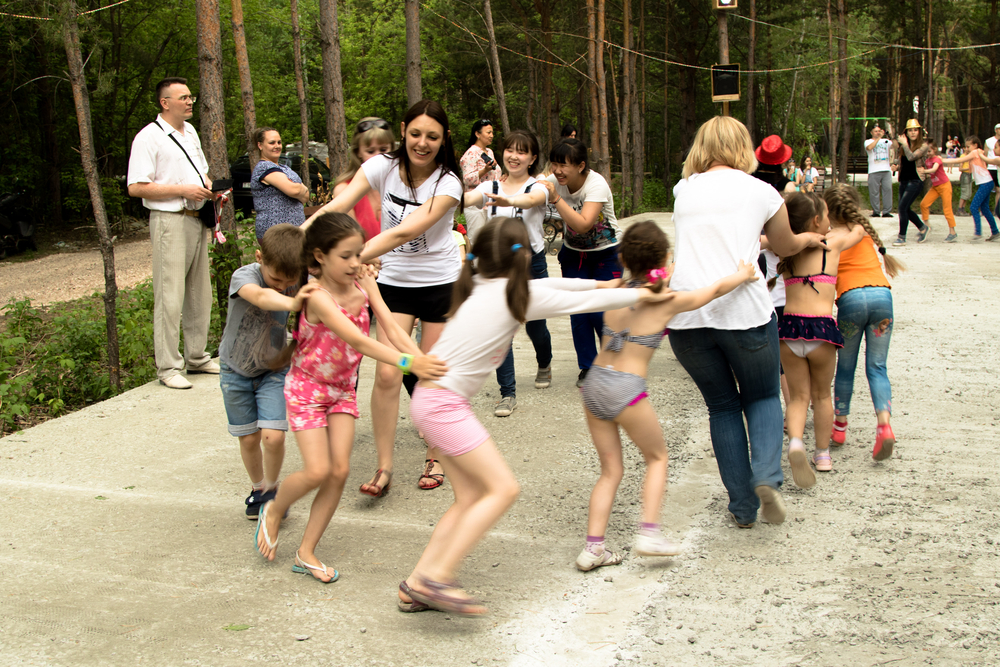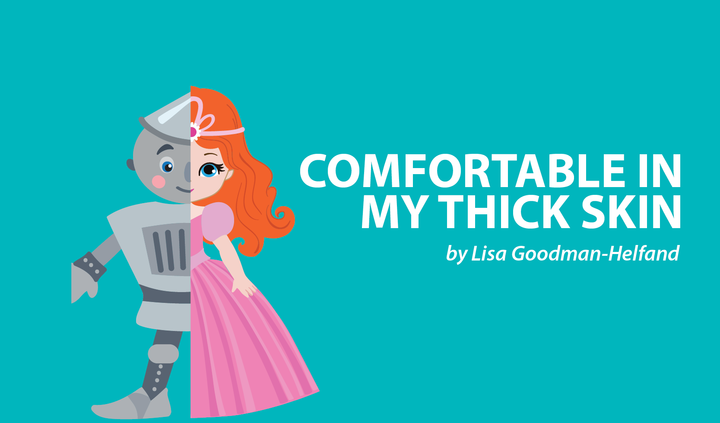Untouchable
Written by |


At our most primal level, we all just want to fit in and be accepted. As a kid with pink and purple broken capillaries (called telangiectasia) sprinkled generously all over my deformed arms and legs, blending in with the crowd was no easy task. I’ve encountered lingering glances from strangers for decades. You would think that as a 42-year-old adult, this shouldn’t cause me to crumble, right? WRONG. It’s amazing how quickly one scent, one stare, one whisper, can transform me into an insecure child.
Over the summer, I went to my daughter’s camp to participate in Parents’ Day activities and experience camp with her. Despite the name of the event, it was only an hour, not an entire day. Usually, Parents’ Day involves me sitting on a chair in the audience watching a skit. If I wear a long-sleeved shirt, heavy makeup, and hide behind a video camera, I’m usually able to pass for an average mom.
The second I entered the camp gym and saw parents sitting on the floor in a circle beside their children, I knew my disguise had failed.
My daughter sees me enter, smiles, and gestures for me to sit next to her. I return her smile and head over. Awkwardly, I sit down on my knees. My strange posture is a sharp contrast to the other parents and kids sitting crossed-legged like a pretzel. It’s as if my legs are encased in a mud mask, but instead of cracking open when I attempt to sit down, the mask grows tighter. I shift from knee to knee as the camp director leads us in a series of morning songs.
Next, we’re instructed to remain seated and play a game that involves clapping down on the hand of the person sitting on either side of you (every scleroderma patient’s nightmare). My daughter is on my left. She’s long since grown accustomed to the feel of my bony fingers that lack padding. To my right is a boy in my daughter’s group. Like clockwork, the moment he first claps down on my hand I see it register in his mind: There’s something very wrong with this lady’s hand. In a fraction of a second, the tween takes a visual inventory of me. I feel his eyes taking stock of my strange hands, the funny way I’m sitting on the floor, the bizarre spots all over my body, and the weird contracted position of my arms.
What happens next is a version of what happened to me hundreds of times as a child. Each time the boy to my right is supposed to clap my hand, he comes ever-so-close, but avoids human contact at all costs. First, he has to tie his shoe, then scratch his nose, then adjust his shorts. He executes these avoidance techniques with finesse. No one notices but me. Like a well-oiled machine, I know that every time the clapping hands loop through the circle, his avoidance cue is my signal to pass the clap on to my daughter. An old familiar feeling seeps through me. I am acutely aware that people don’t want to touch me. I am weird, scary, incapable, unlikable, and abnormal.
I want to turn to the boy and say something like, “Hey, I know my hand feels odd, but don’t worry, I’m not contagious. I have a rare autoimmune disease that makes my skin very tight.” But I say nothing. This 11-year-old kid is trying not to catch some horrible disease. His inclination to recoil from the unknown is instinctual. If I say anything to him, it will only embarrass him and make him more uncomfortable. Instead, I muddle through the hour.
For those 60 minutes, I was reduced to my scleroderma symptoms. I wasn’t a mom, wife, teacher, writer, patient advocate, or speaker. It didn’t matter that I’ve been published in Cosmopolitan or featured in People magazine. It didn’t matter that I’ve taught hundreds of students how to read, survived 218 days in the hospital, or that I have a quirky sense of humor. All people saw was a strange-looking woman with weird hands, mysterious spots, and peculiar limbs. My disease defined me for that hour.
When Parents’ Day mercifully ended, I kissed my daughter goodbye and stepped into the sunshine. As I got into my car, I glimpsed my reflection in the visor’s vanity mirror. For a moment, I saw only what everyone else in that gym saw. Then I looked closer, and I found me. I only lost sight of myself for one hour. Millions around the country and world aren’t that lucky. They never escape being reduced to what others see at first glance.
To learn more about my personal journey with scleroderma, visit my site.
***
Note: Scleroderma News is strictly a news and information website about the disease. It does not provide medical advice, diagnosis, or treatment. This content is not intended to be a substitute for professional medical advice, diagnosis, or treatment. Always seek the advice of your physician or other qualified health provider with any questions you may have regarding a medical condition. Never disregard professional medical advice or delay in seeking it because of something you have read on this website. The opinions expressed in this column are not those of Scleroderma News or its parent company, Bionews Services, and are intended to spark discussion about issues pertaining to scleroderma.






Clare
Hi there, I can totally relate to the experience of scleroderma hands, and people not wanting to touch them. Its a common problem going into shops and exchanging money, feeling the rush of hurt when a stranger withdraws their hand in fear and revulsion, and, if their has been skin contact, actually wipe their hand on their clothes afterwards! Eeek. My hands are swollen mitts with ulcers and are quite weird as well, cause I have muscular dystrophy as well and tend to lurch about as I get around :) Sometimes it's not as hard as other times to deal with strangers reactions (knowing that their fear is an instinctive reaction to 'disease' and not wanting to catch it), helps rationalise away the hurt. Nevertheless, it's a difficult thing to live with,and most people totally take for granted the importance of hands in general. Everytime I meet someone new I get anxious...will they want to shake my hand...? Thank you for sharing your story.
Kind regards,
Clare